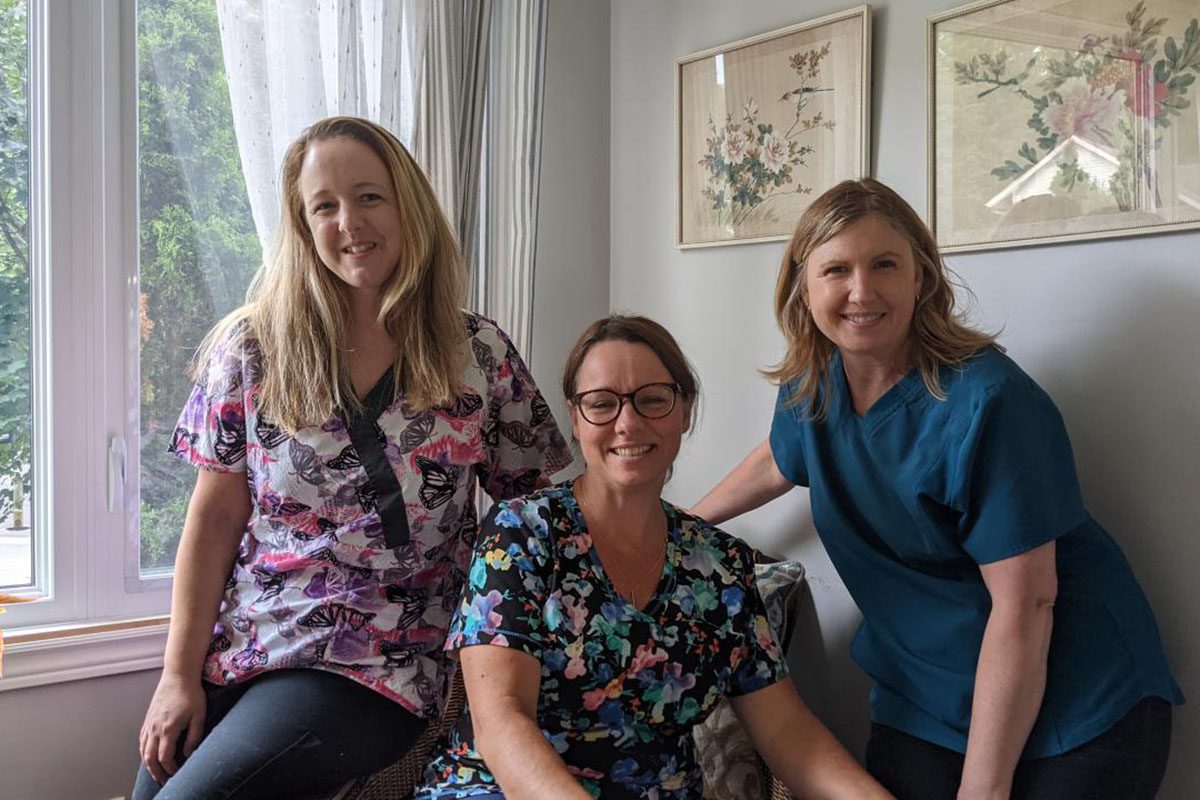Women caring together: How co-ops are the way forward
The Home Care Workers’ Co-operative (HCWC) is a worker cooperative located in the region of Ontario Canada.

CICOPA sat down with Danielle Turpin, founder of Home Care Workers’ Co-operative in Ontario Canada and discussed the recently founded women’s cooperative that is already servicing 300 hours a week.
This article was republished with permission from CICOPA and was originally published in the August 2023 edition of CICOPA’s Work Together newsletter.
Image: Amy Firlotte, Danielle Turpin and Denise Armstrong are co-founders of Home Care Workers’ Co-operative. (Courtesy of Danielle Turpin)
Women caring together
The Home Care Workers’ Co-operative (HCWC) is a worker cooperative located in the region of Ontario Canada.
The idea to establish this cooperative originated when Danielle Turpin, a personal support worker (PSW), got tired of how affairs were handled at the care enterprise where she worked. She noted that home care work involved a lot of components, including the workers’ need to have a voice and be protected, as well as taking into consideration the recipients’ needs.
“I felt complicit. I could see how there was no continuity for our recipients. No holistic care, nor continuity. The clients’ needs were rarely considered. I knew something needed to change, and that is when I decided to leave.”
– explains Turpin
In 2020, she started doing some market studies and looking at various business models. She also came across CICOPA member, the Canada Workers Co-operative Federation, and got in touch with a cooperative consultant. Not long after, she came to the realization that a worker cooperative was the right form of enterprise for the organization she wanted to found.
That is how, in June 2021, the HCWC was born.
As soon as the cooperative got incorporated, it started operations right away. Early enough in their work they noticed that care recipients hired them because they needed their services, however, once they realized that they were a worker cooperative, they would ask for additional hours. Additionally, HCWC started getting a lot of referrals from hospitals, as the publicly funded system simply does not have the capacity to provide needed care, and they have a very good reputation in their area.
Another aspect that has kept the care recipients coming is their personalized services. They try to provide care based on the clients’ needs, not on what a traditional company would envision.
They do not book home visits just for financial gain, but because a recipient actually needs it. The cooperative takes pride in matching the skills of the worker with the needs of the recipients.
The services that HCWC offers are diverse: from non-medical home support to elderly care including toileting, dressing and personal hygiene, medication reminders, among others. They also offer physiotherapy for patients with spinal cord injuries, post-surgery rehabilitation, as well as palliative care and care for dementia. As Turpin explains it, these services are incredibly beneficial for workers and recipients alike, as a home visit allows people to remain in their homes as long as possible, instead of having to move to long-term care facilities.
“I needed to find a way to give workers a voice. As a woman in the care sector, I have seen how other hard-working women have been exploited, and I wanted to change that. I wanted to empower them instead,”
– said Turpin
In its short, but very fruitful life, the cooperative has managed to grow impressively. They currently are providing around 300 hours of care a week, and they serve the areas of Peterborough and its surroundings in Ontario, Canada.
At the moment, the cooperative consists of 13 employees, of which 2 are worker-members. For an employee to become a full worker-member, they must go through a probation period of 400 hours (around 6 months), before receiving a permanent contract and invitation to join as a member. As a part of their cooperative training, they also follow courses such as “good governance matters” and different curricula on cooperatives. This is done in collaboration with CWCF.
When it comes to governance, they meet once per month to discuss all the novelties of the cooperative: financials, client care, areas of concern, policies, and how the workers are doing in general. For elected positions, such as a treasurer or secretary, the standard mandate will last three years.
With their eyes on continuous development and future, the cooperative is working closely with professor Dr. Simon Berge from the Dalhousie University in Halifax in order to create a link with more service cooperatives in the area and to help establish new ones. The idea is to focus specifically on rural areas, and to empower women to establish their service cooperatives.
At the end of the day, they want to provide more training and courses, as Turpin believes cooperative education is crucial, and not taught enough.
“I knew about the existence of cooperatives, but I did not realize how big the movement was. The benefits of cooperatives in their communities are immense, and I wish more people knew about them. It feels like I’ve uncovered the best kept secret”.
Related case studies
Discover how co-ops and mutuals are making a big impact in Australia’s health, community and social services sector, successfully delivering high-quality services and support to those who need it most.Find a care co-op or mutual near you
Use our new interactive map to find care co-ops and mutuals across Australia.




